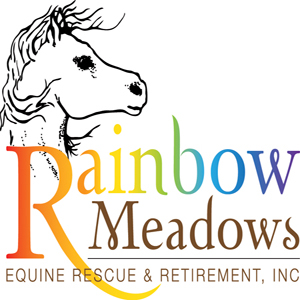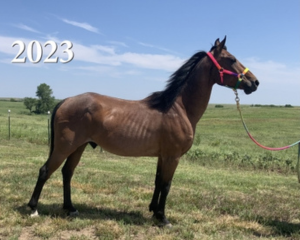Boomer
Mixed Breed Arab-Saddlebred Gelding Age: 21 Height: 14.2 hands
Click
here for more information about Boomer
Offered by Rainbow Meadows Equine Rescue and Retirement, Inc.
Junction City, KS
Best career/placement option for repurposing Boomer:
Recreation/Pleasure Riding
In Training/Under Evaluation
Close X
Boomer is located at Rainbow Meadows Equine Rescue & Retirement, Inc. - JC, 4768 Highway K157, Junction City, KS 66441.
Total acreage dedicated specifically to the horses: 155
Our organization has use of the following at this facility:
Structures/Barns: 1 Run-in sheds: 7
Pastures: 5 Paddocks/Pens/Turnout Areas: 2
Uncovered Outdoor Rings: 1 Covered Outdoor Rings: 1
Indoor Rings: 0
Horses have assigned stalls in the structure(s) or exclusively assigned shelter locations where they are separated from other horses with a barrier.
Horses are stalled for 1-3; hours per day, on average.
The following describes the pastures at this facility:
This facility has a written plan in place for pasture management, which includes guidelines for seeding, fertilizing, irrigation, mowing, dragging, harrowing, manure removal, removal of debris, the control of poisonous plants, and a schedule for cleaning
A dedicated staff person(s) is responsible for pasture management
All pastures are fenced to prevent escape or injury
Barbed wire is used for fencing
Electric fencing is used; electric wires or tape fence are visibly marked
Fencing checks, such as broken or missing planks, loose fence posts, exposed or loose nails, detached wires, etc., are done regularly
Pastures are rotated
Pastures have natural protection for equines (i.e., trees)
Pastures have man-made protection for equines (i.e., shelters)
The following describes the turnout areas other than pastures at this facility:
This facility has a written plan in place for the maintenance of turnout areas, which includes a schedule for cleaning, manure removal, and dragging
A dedicated staff person(s) is responsible for the maintenance of turnout areas
All turnout areas are fenced to prevent escape or injury
Electric fencing is used; electric wires or tape fence are visibly marked
Turnout areas have man-made protection for equines (i.e., shelters)
Fencing checks, such as broken or missing planks, loose fence posts, exposed or loose nails, detached wires, etc., are done regularly
How many hours per day, on average, are horses turned out:
Equines are out 24/7 except they are brought in to feed
The following items are consistent with our feed management plan and practices:
Equines are provided with individualized feeding plans, including supplements, according to the equine's age, breed/type, condition, size, work level and any health issues, consisting of nutritious food provided in sufficient quantity and access to adequate natural forage, or be fed daily, or as recommended by the organization's veterinarian
Equines are fed grain in individual stalls
Staff and/or volunteers are trained in proper feed measurements and protocols and observed periodically to ensure they are feeding correctly
The feed chart is centrally located and updated as needed
The area(s) where hay, feed, grain, and supplements are stored are kept clean, free of debris and chemicals, and protected from weather and other animals in rodent-proof and mold-proof containers and grain bins
Feed, supplements and hay types are clearly labeled
Water sources, i.e., buckets, troughs, automatic waterers, etc. are kept clean, free of contaminants, debris and chemicals, protected from weather and other animals, and be positioned or affixed to minimize spillage.
Medications are kept in a secure area
Clean, potable water is available at all times for all equines
Hoof Care: How often is hoof care provided for each horse? Every 4-8 weeks and when an issue arises
Dental Care: How often is dental care provided for each horse? Annually and when an issue arises
Horse checks: How often are horses visually and physically checked by personnel at the facility? Every day or 6 days a week
Our organization has the following parasite and fly/insect control protocols in place, including remedies used to control flies and insects:
Fly/Insect Control Remedies:
Fly Traps and Tapes
Fly Spray Repellent
Fly Masks
Last Updated: 2025-08-19
Close X
Rehoming:
Our organization has the following re-homing (adoption/purchase) policies and procedures in place:
All potential adopters/purchasers complete a written contract which constitutes the agreement between our organization and the new owner
Our organization will only re-home an equine to a location where another equine resides
Potential adopters/purchasers must visit our organization and be observed with the equine on site
The distance of a potential adopter/purchaser's home from our facility is a consideration for when re-homing an equine
Our organization conducts a site visit of the adopter/purchaser's facility before the transfer of the equine to the adopter/purchaser's facility
The agreement reflects that any individual or organization in possession of the equine as of the date of the agreement and any time thereafter is bound to not sell the equine at auction for slaughter or allow the equine to be sold, transferred, released, or otherwise placed into possession of any person or organization that will cause or allow the equine to be sold at auction for slaughter.
The agreement states that re-homed equines cannot be bred
The agreement states that if there is any breach of contract the equine must be returned to our organization
The agreement states that our organization reserves the right to make unannounced visits
The agreement states that our organization reserves the right to make scheduled visits
The agreement states that adopters/purchasers can return an equine to our organization free of charge
The agreement states that adopters/purchasers can return an equine to our organization for a fee
The agreement states that adopters/purchasers are required to provide updates (photos, vet records) for as long as the adopter/purchaser is responsible for the care of the equine
Our organization requires references from the following:
Personal/Other
Transfer of ownership occurs:
Our organization retains ownership of the equine for its lifetime
The average equine re-homing (adoption/purchase) fee received by your organization:
$501 to $750
Additional information about our rehoming policies and practices:
For further clarification, Rainbow Meadows retains ownership of all adopted horses. An adopter is not permitted to sell, trade, lease or give away any horse. If the adopter can no longer care for the horse, the adopter will return the horse to Rainbow Meadows, however, in the event of the dissolution of Rainbow Meadows, we have chosen to use "may return" and not to use the word 'must return' in our contract. If the rescue elects to close, an amendment to the contract will be initiated, awarding ownership to the adopter(s).
View Re-homing Agreement
Last Updated: 2025-08-19
Close X
Rainbow Meadows Equine Rescue and Retirement, Inc.
4768 Highway K157
Junction City KS 66441
785-257-3005
Last Updated
Public Charity
Our Mission/How we are involved with horses:
Rainbow Meadows Equine Rescue and Retirement, Inc. is dedicated to serving the equine companions who have so loyally served us by offering a safe and peaceful refuge for abused, neglected, discarded horses, which it actively rehabilitates and adopts out to caring homes.
Primary Focus involving horses
(Horse Welfare, Public Service, Sport & Recreation):
Horse Welfare
Our organization operates programs involved with horse rescue, foster care, rehabilitation, adoption and/or retirement. Our organization's primary activity is equine rescue, adoption & retirement.
Our organization is directly responsible for the care and shelter of equines involved in our programs.
Our organization provides outreach and/or public education programs involving horses.
|

EIN: 01-0844944
Founded: 2005
|
View our WEBSITE
View our PHOTO GALLERY
01-30-26
Photos
Click on photo to view larger image
View all our available horses
here



